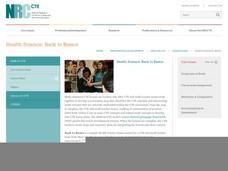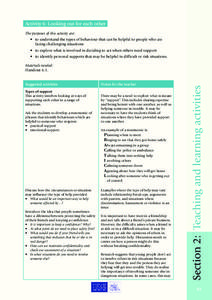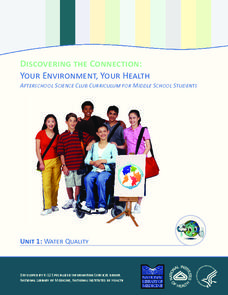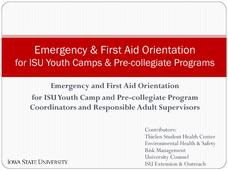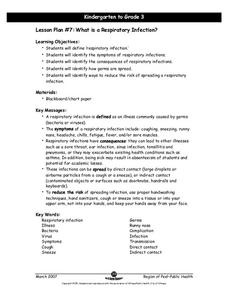Creative Learning Exchange
The Infection Game: The Shape of Change
Encourage the spread of knowledge in your class with this cross-curricular epidemic simulation. Pulling together science, social studies, and math, this lesson engages students in modeling the spread of infectious diseases, collecting...
National Library of Medicine
Your Environment, Your Health: Food Safety
Did youknow that chicken causes the greatest risk of food-borne illness. The fourth unit in a six-part series addresses food safety. Scholars research common scenarios of food causing illness through the National Institute for Health....
National Library of Medicine
Your Environment, Your Health: Air Quality
Some scientists argue that air pollution now causes more deaths than smoking. The second unit in a six-part series focuses on air quality. Scholars learn what's in the air, how clean the air around their school is, and what they can do...
Nemours KidsHealth
Germs: Grades 6-8
As part of their study of bacteria, viruses, fungi, and protozoa, middle schoolers create engaging public service announcements for preschool and kindergarten classes, teaching them how and when to wash their hands. To begin, class...
King County
Reproductive System
It's every health and science teacher's favorite subject to cover: the reproductive system. This comprehensive lesson introduces adolescents to the reproductive anatomy of men and women with the help of a series of diagrams, discussions,...
Howard Hughes Medical Institute
Measuring Obesity
Studies show that obesity is now a global problem. But how are researchers measuring obesity? Young scientists investigate the myriad of methods for measuring body fat through a presentation. From hands-on to high-tech, viewers learn...
National Research Center for Career and Technical Education
Health Science: Back to Basics
This lesson focuses on unit conversion, proportions, ratios, exponents, and the metric system. Discuss measurement with your math class and demonstrate how to solve several health-science word problems. Give learners a chance to visit an...
Teaching Ideas
The Victorians Fact Cards
Want to learn some quick facts about Victorian England? Check out a series of fact cards that include information about class structure, education rights, public health, and Queen Victoria herself.
Centers for Disease Control and Prevention
Youth Exposure to Advertising and E-Cigarette Use
Vaping is increasingly popular with young people. Small wonder given the marketing strategies used by the companies that produce E-cigarettes and vaping flavors like menthol, chocolate, and candy. Check out an infographic that identifies...
New South Wales of Education and Communities
Looking Out for Each Other
As a culmination of a unit on personal safety, class members develop mnemonics to help them remember ways they can offer practical and emotional support to others. In addition, they are asked to apply what they have learned in the unit...
US Surgeon General
Get the Facts on E-Cigarettes
Imagine these flavors: chocolate, candy, menthol. What age group do you imagine is the target audience of an advertising campaign that features a product with these flavors? Find out the facts about vaping with a resource that provides...
PBS
Stories of Painkiller Addiction: Prescription Drug Abuse Awareness Campaign
The I-STOP law was designed to regulate the distribution and tracking of prescription drugs. After reading an article about its signing and implementation, middle and high schoolers work together to come up with their own ideas for an...
National Institute on Drug Abuse
The Brain's Response to Drugs
Marijuana affects the brain differently than inhalants, which have a different effect than opioids. Elementary and middle school classes read about these drugs as well as nicotine, methamphetamine, hallucinogens, and steroids before...
Nemours KidsHealth
Depression: Grades 6-8
Over two lessons, scholars examine depression—what it is, signs of it, and ways to cope. Through discussion, reading articles, writing a resource, and completing worksheets, participants make their way through the learning process,...
Nemours KidsHealth
Germs: Grades 9-12
Beware the bugs! Two activities engage high schoolers in the study of germs, what they are, what they do to the body, and what can be done to prevent them from spreading. After reading a series of related articles, groups create a...
Children’s Hospital of Philadelphia
Case Study: The 1918 Influenza Pandemic – Factors Beyond the Biological that Influence the Spread of Disease
A very timely lesson looks at the social and political factors that affect the spread of disease. Using the 1918 Influenza Pandemic as a case study, pupils research factors that influenced the spread of the disease, including the role of...
Discovery Education
Our Brain and Body on Opioids
Use a presentation that explores the world of prescription opioids. Learners look at the way the brain responds to the drugs and the long terms effects opioids have on the brain and body. At the end of the lesson plan, groups create a...
National Library of Medicine
Your Environment, Your Health: Runoff, Impervious Surfaces, and Smart Development
Can a sidewalk increase the amount of pollution in local streams? Scholars learn the answer to this question though research and experimentation in the fifth unit in the six-part series. Pupils study runoff, impervious surfaces, and the...
National Library of Medicine
Your Environment, Your Health: Water Quality
How important is water quality where you live? The first module in a six-unit series includes four lessons on water quality. By applying the concept directly to the lives of pupils, they engage in meaningful learning. They read about...
National Library of Medicine
Your Environment, Your Health: Chemicals in Your Home
Many people know about chemical pollution, but are all chemicals bad? The third unit in a series of six addresses chemicals common in everyday life. Scholars learn about the chemicals found in their own homes, chemical safety, and...
PBS
Stories of Painkiller Addiction: Contemplating Nature vs. Nurture
Does having an addict in your family make it more likely to become one yourself? Explore the genetic risk factors, as well as the prominent environmental influences, for substance addiction in a lesson that encourages awareness and open...
Iowa State University
Emergency & First Aid Orientation
Here you'll find a presentation that covers a wide range of emergency and first aid topics, such as evacuation planning, what to do in the event of a fire or severe weather, and addressing a number of medical emergencies, such as...
Peel-Public Health
What Is Respiratory Infection?
Give your youngsters a comprehensive introduction to the importance of washing hands and preventing the spread of germs in three activities, which include identifying what germs are, discovering where germs live, and practicing a variety...
Peel-Public Health
What Is Respiratory Infection?
Empower your pupils to be germ stoppers! The heart of these lessons lies in stopping the spread of germs and keeping clean hands in order to prevent cases like a respiratory infection. It includes a game to simulate how germs can spread...
Other popular searches
- Public Health Issue
- Aids Public Health
- Public Health Care
- Black Death Public Health
- Public Health Week
- Epidemic Public Health
- Public Health Resources
- Public Health Needs
- Microbes and Public Health
- Public Health Lessons
- Public Health Pollution
- Public Health Service Message








